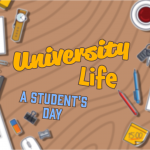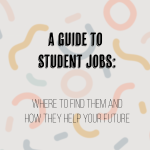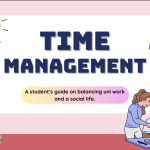 Along with all the benefits of summertime in Bournemouth come the unwelcome and unpreventable exams. As an arts student I got away relatively unscathed during my undergrad. While the physicists and medics slogged away at endless weeks of tests and papers, I had only a handful of 3 hour, high pressure scribble fests. However, exams are stressful regardless of how many you have to sit. As well as making sure you look after yourself properly with plenty of sleep, exercise and a good diet, it’s important to know how you can most effectively study. So, as a jaded postgraduate with years of exams under my belt I can share with you the study methods I personally have found most helpful. Of course everyone’s study habits are different and it’s up to you to find what works best, but I hope the following can at least be a source of inspiration for anyone staring blankly at a pile of text books with no idea where to begin…
Along with all the benefits of summertime in Bournemouth come the unwelcome and unpreventable exams. As an arts student I got away relatively unscathed during my undergrad. While the physicists and medics slogged away at endless weeks of tests and papers, I had only a handful of 3 hour, high pressure scribble fests. However, exams are stressful regardless of how many you have to sit. As well as making sure you look after yourself properly with plenty of sleep, exercise and a good diet, it’s important to know how you can most effectively study. So, as a jaded postgraduate with years of exams under my belt I can share with you the study methods I personally have found most helpful. Of course everyone’s study habits are different and it’s up to you to find what works best, but I hope the following can at least be a source of inspiration for anyone staring blankly at a pile of text books with no idea where to begin…
- Make your study space organised – but not too organised. You can’t study if your desk is a tip – decluttering your space helps declutter your mind so devote a few minutes to organising your work space. However – I am certainly guilty of procrastinating by spending hours making the perfect study space rather than studying.
- Stay offline. Hours and hours can slip past scrolling on Facebook, Instagram and Twitter – all black-holes of distraction where concentration goes to die. As well as being a distraction social media is a platform for comparison. Seeing a picture of your friend’s perfectly organised desk will only make you feel stressed and behind (even though she’s probably spent too much time making the desk look Instagram worthy rather than studying on it…) If your will power isn’t strong enough, ask a trusted friend or family member to change your password until the tests are over. Extreme but effective.
- Know what you need to know. The days of the helpful and clear A-level syllabus are well and truly over. Study is much more independent and you’re no longer spoon fed. However, there are module specifications and grading requirements available and these are essential reading. If you get a clear picture of what the examiner will be looking for then you can tailor your revision effectively.
- Use your space. If you’re a very visual learner like me, reading lines of text on a page isn’t the best way to get information into your memory. Post-its all over your walls, on the bathroom mirror, on the wardrobe will mean you’re taking in information by just being in your room – even when the books are shut.
- Find your own resources. Who says revision should be book based? Being at university means you take control of your learning and expand your academic horizons. Find documentaries from reputable sources on your subject – listen to discussion programmes about ideas or events for new perspectives. Look for reviews from respected publications on the novel or film you’re studying. It will give you a wider range of resources and impress examiners with something different.
- The first rule of revision club… Unless you’re doing a properly planned group revision session in a proper revision environment I would advise that you don’t talk about revision with your course friends. Talk to someone who isn’t about to sit exams, or who doesn’t have the same exams as you otherwise you’ll only get each other stressed by comparing what you’re doing and how much you know.
- Make time for fun things! I used to finish studying by 7pm then have the rest of the evening to relax and just give my brain a rest. Maybe organise dinner with friends or a film night.
- Keep a sense of perspective. Yes exams are important, but it’s not a life or death situation and it won’t be the end of the world if they don’t go as well as you’d have liked. You’re not diffusing a bomb or securing an international trade deal, you’re sitting an exam – let your level of stress adjust accordingly.
By Olivia Beazley









